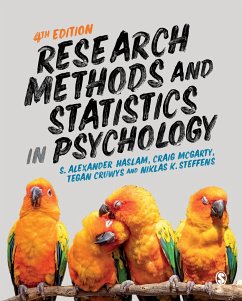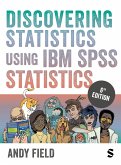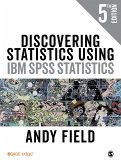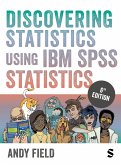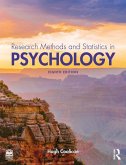- Gebundenes Buch
- Merkliste
- Auf die Merkliste
- Bewerten Bewerten
- Teilen
- Produkt teilen
- Produkterinnerung
- Produkterinnerung
A comprehensive introduction to both quantitative and qualitative research methodologies in Psychology, the book guides readers through every step of the research process and engages with research ethics in Psychology.
Andere Kunden interessierten sich auch für
![Discovering Statistics Using IBM SPSS Statistics Discovering Statistics Using IBM SPSS Statistics]() Andy FieldDiscovering Statistics Using IBM SPSS Statistics52,99 €
Andy FieldDiscovering Statistics Using IBM SPSS Statistics52,99 €![Discovering Statistics Using IBM SPSS Statistics Discovering Statistics Using IBM SPSS Statistics]() Andy FieldDiscovering Statistics Using IBM SPSS Statistics229,99 €
Andy FieldDiscovering Statistics Using IBM SPSS Statistics229,99 €![Discovering Statistics Using IBM SPSS Statistics Discovering Statistics Using IBM SPSS Statistics]() Andy FieldDiscovering Statistics Using IBM SPSS Statistics167,99 €
Andy FieldDiscovering Statistics Using IBM SPSS Statistics167,99 €![Research Methods and Statistics in Psychology Research Methods and Statistics in Psychology]() Hugh Coolican (UK Coventry University)Research Methods and Statistics in Psychology208,99 €
Hugh Coolican (UK Coventry University)Research Methods and Statistics in Psychology208,99 €![Research Methods and Statistics in Psychology Research Methods and Statistics in Psychology]() Hugh Coolican (UK Coventry University)Research Methods and Statistics in Psychology49,99 €
Hugh Coolican (UK Coventry University)Research Methods and Statistics in Psychology49,99 €![Statistics in Plain English Statistics in Plain English]() Timothy C. Urdan (USA Santa Clara University)Statistics in Plain English32,99 €
Timothy C. Urdan (USA Santa Clara University)Statistics in Plain English32,99 €![Probability and Statistics for Computer Scientists Probability and Statistics for Computer Scientists]() Michael BaronProbability and Statistics for Computer Scientists133,99 €
Michael BaronProbability and Statistics for Computer Scientists133,99 €-
-
-
A comprehensive introduction to both quantitative and qualitative research methodologies in Psychology, the book guides readers through every step of the research process and engages with research ethics in Psychology.
Produktdetails
- Produktdetails
- Verlag: Sage Publications Ltd
- 4 Revised edition
- Seitenzahl: 602
- Erscheinungstermin: 27. April 2024
- Englisch
- Abmessung: 252mm x 194mm x 37mm
- Gewicht: 1456g
- ISBN-13: 9781529793673
- ISBN-10: 152979367X
- Artikelnr.: 69793388
- Herstellerkennzeichnung
- Libri GmbH
- Europaallee 1
- 36244 Bad Hersfeld
- gpsr@libri.de
- Verlag: Sage Publications Ltd
- 4 Revised edition
- Seitenzahl: 602
- Erscheinungstermin: 27. April 2024
- Englisch
- Abmessung: 252mm x 194mm x 37mm
- Gewicht: 1456g
- ISBN-13: 9781529793673
- ISBN-10: 152979367X
- Artikelnr.: 69793388
- Herstellerkennzeichnung
- Libri GmbH
- Europaallee 1
- 36244 Bad Hersfeld
- gpsr@libri.de
S Alexander Haslam (Alex Haslam) is Professor of Psychology and Australian Laureate Fellow at the University of Queensland. Together with colleagues, he has written and edited 15 books and over 300 research articles and chapters. His most recent books are The New Psychology of Leadership: Identity, Influence and Power (with Steve Reicher and Michael Platow, 2nd ed. 2020) and Social Psychology: Revisiting the Classic Studies (edited with Joanne Smith, 2nd ed. 2017). He is former Chief Editor of the European Journal of Social Psychology and former President of the Psychology Section of the British Science Association. He is a recipient of the European Association of Social Psychology's Kurt Lewin Medal for research excellence, and the International Society of Political Psychology's Nevitt Sanford Award for contributions to political psychology. He has also received awards for distinguished contributions to psychological science from both the British Psychology Society and the Australian Psychology Society. In 2022 he was appointed a Member of the Order of Australia "for significant service to higher education, particularly psychology, through research and mentoring".
Chapter 1: Introduction
Chapter 2: Research in Psychology: Objectives and Ideals
Chapter 3: Research Methods
Chapter 4: Experimental Design
Chapter 5: Survey Design
Chapter 6: Descriptive Statistics
Chapter 7: Some Principles of Statistical Inference
Chapter 8: Examining Differences between Means: The t-test
Chapter 9: Examining Relationships between Two Variables: Correlation
Chapter 10: Comparing Two or More Means by Analysing Variances: ANOVA
Chapter 11: Examining Relationships between Multiple Independent Variables
and One Dependent Variable: Multiple Regression
Chapter 12: Analysing Other Forms of Data: Chi-square and Distribution-free
Tests
Chapter 13: An Overview of High-Level Quantitative Methods
Chapter 14: Classical Qualitative Methods
Chapter 15: Contextual Qualitative Methods
Chapter 16: Research Ethics
Chapter 17: Conclusion: Managing Uncertainty in Psychological Research
Chapter 2: Research in Psychology: Objectives and Ideals
Chapter 3: Research Methods
Chapter 4: Experimental Design
Chapter 5: Survey Design
Chapter 6: Descriptive Statistics
Chapter 7: Some Principles of Statistical Inference
Chapter 8: Examining Differences between Means: The t-test
Chapter 9: Examining Relationships between Two Variables: Correlation
Chapter 10: Comparing Two or More Means by Analysing Variances: ANOVA
Chapter 11: Examining Relationships between Multiple Independent Variables
and One Dependent Variable: Multiple Regression
Chapter 12: Analysing Other Forms of Data: Chi-square and Distribution-free
Tests
Chapter 13: An Overview of High-Level Quantitative Methods
Chapter 14: Classical Qualitative Methods
Chapter 15: Contextual Qualitative Methods
Chapter 16: Research Ethics
Chapter 17: Conclusion: Managing Uncertainty in Psychological Research
Chapter 1: Introduction
Chapter 2: Research in Psychology: Objectives and Ideals
Chapter 3: Research Methods
Chapter 4: Experimental Design
Chapter 5: Survey Design
Chapter 6: Descriptive Statistics
Chapter 7: Some Principles of Statistical Inference
Chapter 8: Examining Differences between Means: The t-test
Chapter 9: Examining Relationships between Two Variables: Correlation
Chapter 10: Comparing Two or More Means by Analysing Variances: ANOVA
Chapter 11: Examining Relationships between Multiple Independent Variables and One Dependent Variable: Multiple Regression
Chapter 12: Analysing Other Forms of Data: Chi-square and Distribution-free Tests
Chapter 13: An Overview of High-Level Quantitative Methods
Chapter 14: Classical Qualitative Methods
Chapter 15: Contextual Qualitative Methods
Chapter 16: Research Ethics
Chapter 17: Conclusion: Managing Uncertainty in Psychological Research
Chapter 2: Research in Psychology: Objectives and Ideals
Chapter 3: Research Methods
Chapter 4: Experimental Design
Chapter 5: Survey Design
Chapter 6: Descriptive Statistics
Chapter 7: Some Principles of Statistical Inference
Chapter 8: Examining Differences between Means: The t-test
Chapter 9: Examining Relationships between Two Variables: Correlation
Chapter 10: Comparing Two or More Means by Analysing Variances: ANOVA
Chapter 11: Examining Relationships between Multiple Independent Variables and One Dependent Variable: Multiple Regression
Chapter 12: Analysing Other Forms of Data: Chi-square and Distribution-free Tests
Chapter 13: An Overview of High-Level Quantitative Methods
Chapter 14: Classical Qualitative Methods
Chapter 15: Contextual Qualitative Methods
Chapter 16: Research Ethics
Chapter 17: Conclusion: Managing Uncertainty in Psychological Research
Chapter 1: Introduction
Chapter 2: Research in Psychology: Objectives and Ideals
Chapter 3: Research Methods
Chapter 4: Experimental Design
Chapter 5: Survey Design
Chapter 6: Descriptive Statistics
Chapter 7: Some Principles of Statistical Inference
Chapter 8: Examining Differences between Means: The t-test
Chapter 9: Examining Relationships between Two Variables: Correlation
Chapter 10: Comparing Two or More Means by Analysing Variances: ANOVA
Chapter 11: Examining Relationships between Multiple Independent Variables
and One Dependent Variable: Multiple Regression
Chapter 12: Analysing Other Forms of Data: Chi-square and Distribution-free
Tests
Chapter 13: An Overview of High-Level Quantitative Methods
Chapter 14: Classical Qualitative Methods
Chapter 15: Contextual Qualitative Methods
Chapter 16: Research Ethics
Chapter 17: Conclusion: Managing Uncertainty in Psychological Research
Chapter 2: Research in Psychology: Objectives and Ideals
Chapter 3: Research Methods
Chapter 4: Experimental Design
Chapter 5: Survey Design
Chapter 6: Descriptive Statistics
Chapter 7: Some Principles of Statistical Inference
Chapter 8: Examining Differences between Means: The t-test
Chapter 9: Examining Relationships between Two Variables: Correlation
Chapter 10: Comparing Two or More Means by Analysing Variances: ANOVA
Chapter 11: Examining Relationships between Multiple Independent Variables
and One Dependent Variable: Multiple Regression
Chapter 12: Analysing Other Forms of Data: Chi-square and Distribution-free
Tests
Chapter 13: An Overview of High-Level Quantitative Methods
Chapter 14: Classical Qualitative Methods
Chapter 15: Contextual Qualitative Methods
Chapter 16: Research Ethics
Chapter 17: Conclusion: Managing Uncertainty in Psychological Research
Chapter 1: Introduction
Chapter 2: Research in Psychology: Objectives and Ideals
Chapter 3: Research Methods
Chapter 4: Experimental Design
Chapter 5: Survey Design
Chapter 6: Descriptive Statistics
Chapter 7: Some Principles of Statistical Inference
Chapter 8: Examining Differences between Means: The t-test
Chapter 9: Examining Relationships between Two Variables: Correlation
Chapter 10: Comparing Two or More Means by Analysing Variances: ANOVA
Chapter 11: Examining Relationships between Multiple Independent Variables and One Dependent Variable: Multiple Regression
Chapter 12: Analysing Other Forms of Data: Chi-square and Distribution-free Tests
Chapter 13: An Overview of High-Level Quantitative Methods
Chapter 14: Classical Qualitative Methods
Chapter 15: Contextual Qualitative Methods
Chapter 16: Research Ethics
Chapter 17: Conclusion: Managing Uncertainty in Psychological Research
Chapter 2: Research in Psychology: Objectives and Ideals
Chapter 3: Research Methods
Chapter 4: Experimental Design
Chapter 5: Survey Design
Chapter 6: Descriptive Statistics
Chapter 7: Some Principles of Statistical Inference
Chapter 8: Examining Differences between Means: The t-test
Chapter 9: Examining Relationships between Two Variables: Correlation
Chapter 10: Comparing Two or More Means by Analysing Variances: ANOVA
Chapter 11: Examining Relationships between Multiple Independent Variables and One Dependent Variable: Multiple Regression
Chapter 12: Analysing Other Forms of Data: Chi-square and Distribution-free Tests
Chapter 13: An Overview of High-Level Quantitative Methods
Chapter 14: Classical Qualitative Methods
Chapter 15: Contextual Qualitative Methods
Chapter 16: Research Ethics
Chapter 17: Conclusion: Managing Uncertainty in Psychological Research

